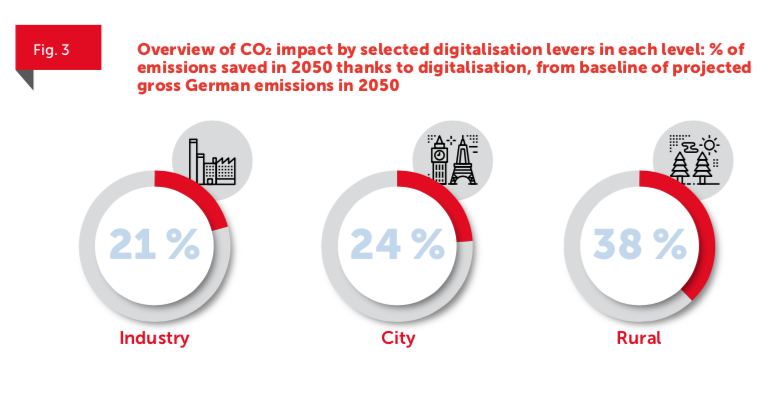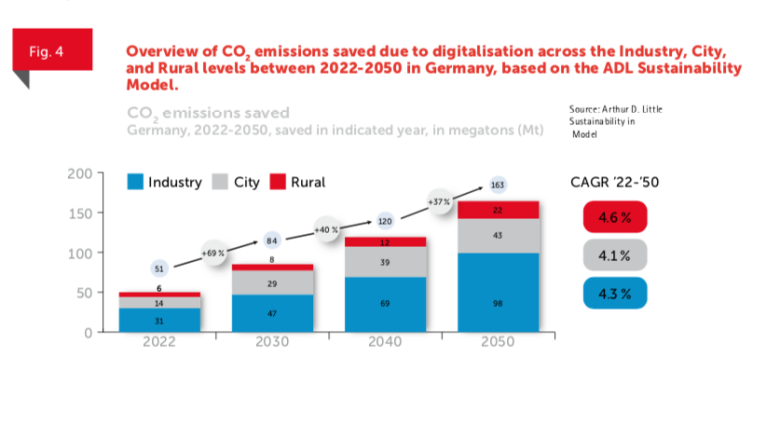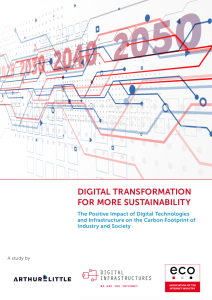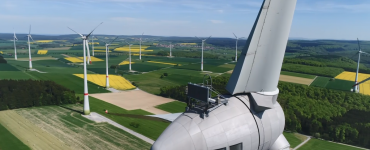Study
Digital Transformation for More Sustainability:
The Positive Impact of Digital Technologies and Infrastructures on the Carbon Footprint of Industry and Society
More sustainability due to digitalisation
With climate change now being omnipresent, sustainability has come to be one of the most pressing issues of our time. In order to achieve the climate goals set by the German federal government and climate neutrality in line with the Paris Agreement by 2050, the consistent use of digital technologies and the expansion of digital infrastructures are an indispensable part of the solution. Smart technologies are the key to more CO2 savings and greater sustainability.
This is exemplified in the study: “Digital Transformation for More Sustainability: The Positive Impact of Digital Technologies and Infrastructures on the Carbon Footprint of Industry and Society”, published by the eco Association in cooperation with the eco-founded Alliance for the Strengthening Digital Infrastructures in Germany and Arthur D. Little.
One factor that the study clearly shows: Digital infrastructures alongside digital technologies and services offer enormous potential for reducing greenhouse gas emissions – that is, if they are used consistently in the right domains. In urban areas, connected mobility and holistic smart city concepts are solution scenarios for the increasing level of emissions brought about by growing urbanisation. In rural areas, smart farming solutions and hybrid working environments are particularly instrumental in reducing CO2 emissions.
The German industry also has a specific responsibility in shaping the transformation of an ecologically sustainable economy. Digital twins, augmented reality and Internet of Things (IoT) applications are the key technologies for leveraging potential for more CO2 savings in the industry sector.


As the calculations of the ADL Sustainability Model show, annual emissions in Germany can be reduced by an average of 4.3 % in the industry sector on the strength of digital levers, while a 4.1 % reduction in urban habitats (cities) and 4.6 % in rural areas (non-urban habitats + farming) is also possible.
By 2050, it is anticipated that emissions savings of 163 megatonnes of CO2 will be achieved through the consistent use of digital levers at the industry, urban and rural levels. This equates to around 20 % of the total emissions forecast for Germany. If these are supplemented by innovative technologies in the levels of data storage and transmission, CO2 emissions could even be reduced by 30 % by 2050.
In the study, you can find further results on the potential CO2 savings that the various sectors can achieve through digitalisation. The complete study is available for download as a PDF.
Study methodology: the ADL Sustainability Model
This study examines the effects of digital transformation in the areas of Industrial, Urban (city) and Rural (rural living and farming) on resource efficiency and CO2 emissions. Focus is put on the application of innovative technologies based on digital infrastructure in the areas of data processing, data transmission and data storage. The study forecasts CO2 emissions for Germany in 2050 and compares them with the potential savings from introducing digital technologies and services.
The data on which the calculations are based come from official sources, e.g. EUR-Lex, the German Federal Environment Agency, the German Federal Motor Transport Authority, the German Federal Statistical Office and statistical databases (e.g. Statista), which have been supplemented by expert estimates. The effects were systematically calculated in a quantitative model.
Digital Transformation for More Sustainability:
The Positive Impact of Digital Technologies and Infrastructures on the Carbon Footprint of Industry and Society

Table of content
- Preface
- Management Summary
- Short introduction
- Core content:
Global sustainability targets require innovation across all technologies, including digitalisation
Digitalisation remains the central tool for reducing CO2 emissions without a significant compromise in living standards
ADL Sustainability Modell
Industry: Smart industry Smart grids
City: Connected Mobility Smart parking Smart Homes Smart waste management
Rural living: Remote Working Smart Farming
Data centres are energy consumers, yet enable sustainable digitalisation
Digitalisation allows significant savings in German emissions projections
Germany is transforming its energy sector from a major emitter of greenhouse gases to planned net-negative
Creating a sustainable digital ecosystem requires a collaborative effort from all stakeholders
Literature
Your eco contact person for the study

Head of Communications, eco Association
Telefon: +49 (30) 20 21 567 - 0
Email address: sidonie.krug(at)eco.de




